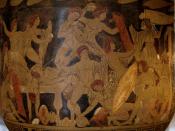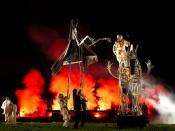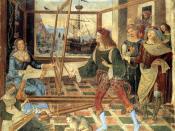While reading The Odyssey one can not help but wonder at the relationship between immortals and mortals. It appears to be a complicated give and take. Not only do the gods rule the world, but they try to rule each other, in a tug of war that can hamper a person's best intentions (226-228). The gods expect to be worshipped and humans expect the gods to answer petitions. However, how the gods respond can make or break a life or even a civilization.
The gods of Homer's story are not omnipresent, as is demonstrated through their moving across the earth gathering information or intervening in a mortal's life. Athena demonstrates her lack of omnipresence by visiting the home of Odysseus to observe what is going on in his household (227). In contrast, today's Judaism, Christianity, and Islam have an omnipresent god.
The gods, for their own purposes, also used disguises in order to interact with people.
A person knew that at any given moment he may possibly be interacting with a god. Some of Penelope's suitors note this and say, "A poor show, that--hitting this famished tramp--bad business, if he happened to be a god" (443). Athena also appears several times as a human and moves freely among people (230).
Humanity knows that the gods pull strings, manage their lives, and bring prosperity or ruin to whom they will. Sometimes the gods use guile and goad a human into action, as Athena does while speaking to Telemakhos about putting a stop to the suitors' impudence. She manipulates him by saying, "You need not bear this insolence of theirs, you are no longer a child" [emphasis added] (232). Poseidon takes a more direct approach and causes harm to Odysseus and his crew (226).
Since the gods intervene so much, it is no wonder that people blame them for the bad and the good things that happen. Such is the case when Odysseus exclaims that "Zeus the son of Kronos brought me down" (461). In this instance, Odysseus claims that his own actions did not cause his decline to a beggar, but was a god's fault.
Humanity has two main duties to the gods: To make sacrifices in the form of meat, blood, grain, honey, and wine, and to pray to the gods (281, 247, 374, and 461). However, neither of these means that one would find favor with the gods. It is interesting to note that humanity expects answers from the deities. Homer makes it clear that there is a back and forth communication, such as when Odysseus prays for a positive sign indicating that his return home is blessed. Zeus answers with a loud clap of thunder. Even those that did not pray at that moment knew that someone's supplication had been answered (476-477).
The interactions between mortals and immortals is complex, and yet simple. The gods run the world and the affairs of men and men pray to the gods, while hoping for a positive response. It is as though the world is a game board for the immortals and they do what they want on a whim. Favor can be with a person and suddenly lost. Everything from the rising sun to the storms at sea is handled by the gods. Meanwhile, humans hope that they will not get caught on the wrong side of a god's temper.
Work Cited Lawall, Sarah, Ed. The Norton Anthology of World Literature: Beginning to 100. 2nd ed. Vol. A. London: W.W. Norton and Company, 2001. Odyssey. pp. 388-401 and 416-516.





